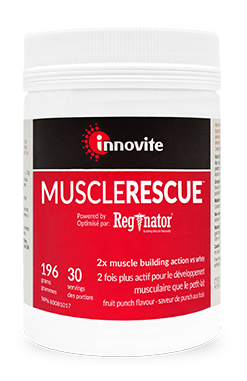Sarcopenia – Reducing Frailty and Improving Quality of Life
Sarcopenia is the gradual age-related loss of skeletal muscle mass and strength. This condition can affect our ability to perform daily tasks, increase the risk of disease, and decrease our lifespan. Fortunately, through exercise, dietary choices, and supplementation, we can help maintain muscle mass and even build strength as we age.
The Honolulu-Asia Aging Study published in 2011 followed 2,239 men for 44 years, beginning when they were between 56 and 68 years of age. Researchers found that a healthy lifestyle, maternal longevity, height (shorter men lived longer than tall), and handgrip strength were associated with maximum lifespan. Handgrip strength is often used as a measure of body strength, indicating a physiological reserve that is protective against age-related disease, disability, and mortality. Other tests related to muscle strength measured in the study included natural walking speed (faster was better), the ability to get up from the floor without hand support, and the number of times one could rise from a chair in 60 seconds (37 or more was associated with a reduced risk of death). Forty-seven members of this study group became centenarians, living to at least 100 years.

Protein
While regular exercise is important for preventing sarcopenia, research has proven that insufficient dietary protein can lead to loss of muscle size and strength even with exercise. In a study published in the British Journal of Nutrition, those over 50 who exercised and consumed less than 70 g of protein daily did not see the expected muscle-building benefits. An estimated 20% of those over 50 are not consuming adequate dietary protein.
For sedentary adults 71 and older, the ideal daily protein intake for building or maintaining muscle should be a minimum of .54 grams per pound of body weight. This translates to at least 108 g of protein every day if you weigh 200 pounds, 82 g daily if you weigh 150 pounds, or 66 g for 120 pounds. Protein requirements increase with levels of fitness and activity. If your workouts are intense, .75 to 1 gram of protein per pound of body weight may be required (30%-60% more than those who aren't active). To increase the benefits of dietary or supplementary protein for building muscle, it's important to include quality carbohydrates that enhance muscle growth and repair.
One study found that the ideal dietary approach for maximizing the conversion of protein to the important essential amino acids required for muscle protein synthesis is 0.18 g/pound each meal, spread out over four meals. This could include protein shakes or free-form amino acid supplements, adding up to at least 0.72 g per pound daily. This approach is superior to consuming a large quantity of protein in a single meal.

Reduced muscle mass and strength can lead to a decline in balance and contribute to falls – a primary cause of serious injury and death among older adults. Building muscle is essential to quality of life at any age, making it easier to perform the activities of daily living. Regular exercise and movement (especially when combined with the nine essential amino acids) can help reduce the pain of arthritis, improving mobility and independence. I recommend tai chi, a wonderful gentle form of movement popular in Asia that can reduce the risk of falls while improving gait and balance.
Amino Acids
The building blocks of protein, amino acids are needed for all vital bodily processes including the synthesis of hormones and neurotransmitters, energy production, immune function, nutrient absorption, and the regulation of sleep, mood, and behavior. Amino acids are required for muscle development, as well as repair and recovery, working to prevent muscle breakdown and preserve lean body mass, especially in the elderly.
Histidine, isoleucine, leucine, lysine, methionine, phenylalanine, threonine, tryptophan, and valine are classified as essential amino acids. These organic compounds cannot be made by the body and must be obtained through the diet or supplementation.
Not only critical for building muscle and strength, protein provides the building blocks for every cell in our body. Many people find that they have more energy and feel better when they consume more protein. Until recently, the predominant advice has been to choose foods that are high in protein like meat, eggs, and fish, which are then "converted" into amino acids. But, a little known fact is that most dietary proteins have a low rate of amino acid utilization (AAU), which can result in lower strength and muscular gains.
The best source of dietary protein is breast milk, with an AAU of 49%. Whole eggs (with yolk) are a close second, with an AAU of 47% (egg whites have an AAU of only 17%). Meat, poultry, and fish have an AAU of 32%, but even some of the most expensive protein powders have an AAU of only 17%. This means that about 83% of the protein is turned into sugar (triggering an insulin response that results in fat storage). As we age, production of digestive enzymes decreases and our digestive systems become less efficient, so these percentages can be even lower. Older adults can often benefit from taking digestive enzymes that allow the nutrients in food (including proteins) to be better absorbed into the bloodstream.
In the past, I've recommended protein powders made from whey, fermented or sprouted grains, and Styrian pumpkin seeds. While these are excellent and nutritious sources of quality protein, their actual AAU is disappointing.
After 20 years of research, 24 human trials, and over 500 publications, Dr. Robert Wolfe at the University of Arkansas developed an essential amino acid formula to help burn patients maintain muscle mass and facilitate recovery. Three times more effective than whey protein isolate at building muscle, they found that the formula increased muscle mass even when patients couldn't exercise. This lead to NASA incorporating the product into the diet of astronauts to help preserve muscle function and strength while on space missions. Marketed by a number of companies as Reginator, it works to replace the essential amino acids that are lost during digestion, exercise, and the aging process. Unlike dietary proteins from food, free-form amino acids do not require digestion and can be quickly used by the body to build muscle, increase strength, and prevent muscle loss. Essential amino acid formulas have been found to have an AAU of 99% (almost entirely usable by the body), with only 1% excreted as waste.
This vegan amino acid blend can help increase energy production, muscle metabolism, and mental focus. The patented Reginator formula efficiently builds new muscle tissue, strengthen bones, and assists with cellular repair, while also helping to improve sleep and reduce stress. As protein forms hair, skin, muscles, and bone, it's not surprising that users also report younger-looking skin, and stronger, shinier hair. To maximize these effects, I recommend taking vitamin C, lysine, proline, and silica, which can boost collagen production in the body, especially when combined with Reginator. With almost zero calories, it's ideal for ketogenic diets or diets that restrict proteins, ensuring a sufficient supply of amino acids for achieving optimum health and wellness.

Now available in Canada as Innovite Muscle Rescue, this incredible formula has been shown to boost muscle tissue twice as much as whey protein supplement powders, but it also stimulates protein synthesis even without exercise. One 3.6 gram serving is equivalent to 15 grams of whey protein isolate.
In addition to protein and amino acids, there are a number of other supplements that can be effective for building and enhancing muscle mass. One of the most popular natural products for enhancing athletic performance, recent research has shown that regular use of creatine (just 5 grams a day) can also help improve cognition and memory. I recommend ZipFuel, a great tasting alkaline powder that uses three types of creatine. I've found that combining it with Reginator gives me more energy and provides a synergistic benefit for building muscle and improving strength.
Ashwagandha is well-known as an adaptogen herb that helps the body deal with stress by reducing cortisol levels. In a placebo-controlled clinical trial, a group treated with 300 mg per day of ashwagandha (KSM-66) showed significant increases in muscle size, strength, and testosterone levels.
The American Journal of Clinical Nutrition found that omega-3 polyunsaturated fatty acids from fish oil have important muscle-building and physical performing benefits for older adults which can delay, prevent, or in some cases even cure sarcopenia.
A healthy diet supplemented with protein, essential amino acids, creatine, ashwagandha, and omega-3 can help build muscle and increase strength, contributing to a longer, better, and more enjoyable quality of life.
Health Disclaimer. Copyright ©2016-2019. Nathan Zassman is a trained nutrition practitioner and the owner of Aviva Natural Health Solutions.
First published in July, 2016. Latest major revision December 2019.
